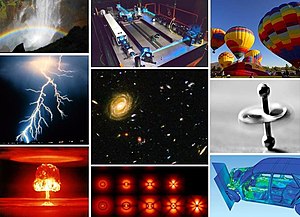পদাৰ্থ বিজ্ঞান
পদাৰ্থ বিজ্ঞান (ইংৰাজী: Physics) হৈছে প্ৰাকৃতিক বিজ্ঞানৰ এটা গুৰুত্বপূৰ্ণ শাখা য'ত স্থান-কালৰ মাজেৰে পদাৰ্থ, ইয়াৰ গতি আৰু আচৰণকে ধৰি অন্যান্য সংযুক্ত ধাৰণাসমূহ; যেনে শক্তি আৰু বল ইত্যাদি বিষয়সমূহ অধ্যয়ন কৰা হয়।[1][2] বুনিয়াদী বৈজ্ঞানিক অধ্যয়নৰ ক্ষেত্ৰসমূহৰ ভিতৰত পদাৰ্থ বিজ্ঞান অন্যতম আৰু ইয়াৰ মূল উদ্দেশ্য হৈছে প্ৰকৃতিৰ পৰিঘটনাসমূহ পুংখানুপুংখভাৱে অধ্যয়ন কৰা। [টোকা 1][3][4][5]

পদাৰ্থ বিজ্ঞান প্ৰাচীন বিদ্যায়তনিক বিষয়সমূহৰ ভিতৰত অন্যতম। সম্ভৱতঃ জ্যোতিৰ্বিজ্ঞানৰ অন্তৰ্ভুক্তিৰ ফলস্বৰূপে ই প্ৰাচীনতম বিদ্যায়তনিক বিষয় হিচাপে স্বীকৃতি লাভ কৰিছে।[6] শেষৰ দুটা সহস্ৰাব্দলৈ পদাৰ্থ বিজ্ঞান, ৰসায়ন বিজ্ঞান, জীৱ বিজ্ঞান আৰু গণিতৰ কিছুসংখ্যক শাখা প্ৰাকৃতিক দৰ্শনৰ অংশ আছিল যদিও ১৭ শতিকাৰ বৈজ্ঞানিক বিপ্লৱৰ সময়ছোৱাত এই প্ৰাকৃতিক বিজ্ঞানসমূহ সিহঁতৰ নিজস্ব অধিকাৰত একক অনুসন্ধান প্ৰয়াস হিচাপে জ্ঞাত হয়। [টোকা 2]
টোকা
সম্পাদনা কৰক- ↑ The term "universe" is defined as everything that physically exists: the entirety of space and time, all forms of matter, energy and momentum, and the physical laws and constants that govern them. However, the term "universe" may also be used in slightly different contextual senses, denoting concepts such as the cosmos or the philosophical world.
- ↑ Francis Bacon's 1620 Novum Organum was critical in the development of scientific method.[7]
তথ্যসূত্ৰ
সম্পাদনা কৰক- ↑ At the start of The Feynman Lectures on Physics, Richard Feynman offers the atomic hypothesis as the single most prolific scientific concept: "If, in some cataclysm, all [] scientific knowledge were to be destroyed [save] one sentence [...] what statement would contain the most information in the fewest words? I believe it is [...] that all things are made up of atoms – little particles that move around in perpetual motion, attracting each other when they are a little distance apart, but repelling upon being squeezed into one another ..." (Feynman, Leighton & Sands 1963, পৃষ্ঠা I-2)
- ↑ "Physical science is that department of knowledge which relates to the order of nature, or, in other words, to the regular succession of events." (Maxwell 1878, পৃষ্ঠা 9)
- ↑ "Physics is one of the most fundamental of the sciences. Scientists of all disciplines use the ideas of physics, including chemists who study the structure of molecules, paleontologists who try to reconstruct how dinosaurs walked, and climatologists who study how human activities affect the atmosphere and oceans. Physics is also the foundation of all engineering and technology. No engineer could design a flat-screen TV, an interplanetary spacecraft, or even a better mousetrap without first understanding the basic laws of physics. (...) You will come to see physics as a towering achievement of the human intellect in its quest to understand our world and ourselves.Young & Freedman 2014, p. 1
- ↑ "Physics is an experimental science. Physicists observe the phenomena of nature and try to find patterns that relate these phenomena."Young & Freedman 2014, p. 2
- ↑ "Physics is the study of your world and the world and universe around you." (Holzner 2006, পৃষ্ঠা 7)
- ↑ Krupp 2003
- ↑ Cajori 1917, pp. 48–49
বাহ্যিক সংযোগ
সম্পাদনা কৰক| ৱিকিমিডিয়া কমন্সত পদাৰ্থ বিজ্ঞান সম্পৰ্কীয় মিডিয়া ফাইল আছে। |